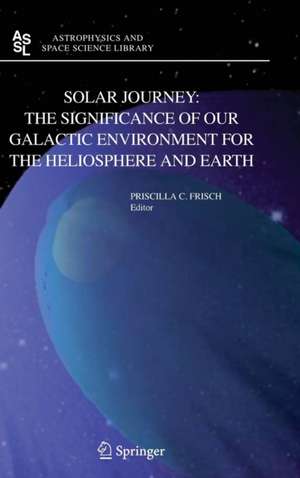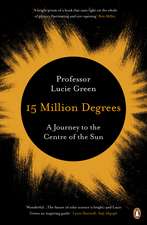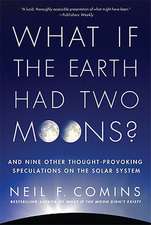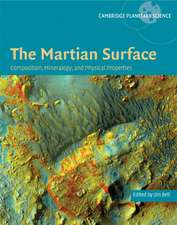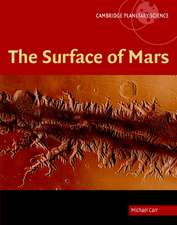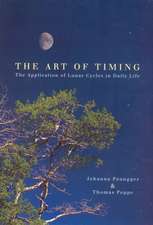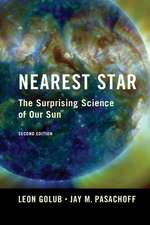Solar Journey: The Significance of Our Galactic Environment for the Heliosphere and Earth: Astrophysics and Space Science Library, cartea 338
Editat de P.C. Frischen Limba Engleză Hardback – sep 2006
Twelve articles from leading experts in diverse fields discuss the physical changes expected as the heliosphere adjusts to its galactic environment. Topics include the interaction between the solar wind and interstellar dust and gas, cosmic ray modulation, magnetospheres, temporal variations in the solar environment, and the cosmic ray isotope record preserved in paleoclimate data.
| Toate formatele și edițiile | Preț | Express |
|---|---|---|
| Paperback (1) | 951.29 lei 6-8 săpt. | |
| SPRINGER NETHERLANDS – 23 noi 2014 | 951.29 lei 6-8 săpt. | |
| Hardback (1) | 960.61 lei 6-8 săpt. | |
| SPRINGER NETHERLANDS – sep 2006 | 960.61 lei 6-8 săpt. |
Din seria Astrophysics and Space Science Library
- 24%
 Preț: 799.08 lei
Preț: 799.08 lei - 15%
 Preț: 647.92 lei
Preț: 647.92 lei - 18%
 Preț: 983.81 lei
Preț: 983.81 lei - 18%
 Preț: 790.28 lei
Preț: 790.28 lei -
 Preț: 359.85 lei
Preț: 359.85 lei -
 Preț: 389.70 lei
Preț: 389.70 lei - 20%
 Preț: 691.13 lei
Preț: 691.13 lei - 18%
 Preț: 1011.27 lei
Preț: 1011.27 lei -
 Preț: 402.56 lei
Preț: 402.56 lei - 15%
 Preț: 664.93 lei
Preț: 664.93 lei -
 Preț: 398.15 lei
Preț: 398.15 lei - 18%
 Preț: 954.77 lei
Preț: 954.77 lei -
 Preț: 411.04 lei
Preț: 411.04 lei - 18%
 Preț: 1225.31 lei
Preț: 1225.31 lei - 18%
 Preț: 1843.29 lei
Preț: 1843.29 lei -
 Preț: 393.13 lei
Preț: 393.13 lei -
 Preț: 400.26 lei
Preț: 400.26 lei - 18%
 Preț: 953.82 lei
Preț: 953.82 lei - 18%
 Preț: 960.61 lei
Preț: 960.61 lei -
 Preț: 398.35 lei
Preț: 398.35 lei -
 Preț: 390.84 lei
Preț: 390.84 lei -
 Preț: 413.76 lei
Preț: 413.76 lei -
 Preț: 416.64 lei
Preț: 416.64 lei - 18%
 Preț: 947.67 lei
Preț: 947.67 lei -
 Preț: 404.51 lei
Preț: 404.51 lei - 18%
 Preț: 956.50 lei
Preț: 956.50 lei -
 Preț: 403.75 lei
Preț: 403.75 lei - 18%
 Preț: 1229.40 lei
Preț: 1229.40 lei - 18%
 Preț: 1224.99 lei
Preț: 1224.99 lei -
 Preț: 404.29 lei
Preț: 404.29 lei - 15%
 Preț: 654.77 lei
Preț: 654.77 lei - 18%
 Preț: 1248.20 lei
Preț: 1248.20 lei - 18%
 Preț: 955.25 lei
Preț: 955.25 lei - 18%
 Preț: 1846.28 lei
Preț: 1846.28 lei - 18%
 Preț: 1233.06 lei
Preț: 1233.06 lei - 18%
 Preț: 1234.77 lei
Preț: 1234.77 lei -
 Preț: 411.64 lei
Preț: 411.64 lei
Preț: 960.61 lei
Preț vechi: 1171.47 lei
-18% Nou
Puncte Express: 1441
Preț estimativ în valută:
183.86€ • 189.48$ • 155.22£
183.86€ • 189.48$ • 155.22£
Carte tipărită la comandă
Livrare economică 04-18 martie
Preluare comenzi: 021 569.72.76
Specificații
ISBN-13: 9781402043970
ISBN-10: 140204397X
Pagini: 440
Ilustrații: XXV, 413 p.
Dimensiuni: 155 x 235 x 29 mm
Greutate: 0.88 kg
Ediția:2006
Editura: SPRINGER NETHERLANDS
Colecția Springer
Seria Astrophysics and Space Science Library
Locul publicării:Dordrecht, Netherlands
ISBN-10: 140204397X
Pagini: 440
Ilustrații: XXV, 413 p.
Dimensiuni: 155 x 235 x 29 mm
Greutate: 0.88 kg
Ediția:2006
Editura: SPRINGER NETHERLANDS
Colecția Springer
Seria Astrophysics and Space Science Library
Locul publicării:Dordrecht, Netherlands
Public țintă
ResearchCuprins
Introduction: Paleoheliosphere versus PaleoLISM.- Heliospheric Variation in Response to Changing Interstellar Environments.- The Influence of the Interstellar Magnetic Field on the Heliospheric Interface.- Interstellar Conditions and Planetary Magnetospheres.- Long-term Variations in the Galactic Environment of the Sun.- Short-term Variations in the Galactic Environment of the Sun.- Variations of the Interstellar Dust Distribution in the Heliosphere.- Effects in the Inner Heliosphere Caused by Changing Conditions in the Galactic Environment.- Variable Terrestrial Particle Environments During the Galactic Orbit of the Sun.- The Galactic Cosmic Ray Intensity in the Heliosphere in Response to Variable Interstellar Environments.- Accretion of Interstellar Material into the Heliosphere and onto Earth.- Variations of Galactic Cosmic Rays and the Earth's Climate.
Recenzii
"I admire the great care that Priscilla Frisch has taken in the editorial work, the balanced subjects, the attractive and clear figures. Also the general topic is well chosen and the various chapters are presented very clearly." - C. de Jager
Textul de pe ultima copertă
Humans evolved when the Sun was in the great void of the Local Bubble. The Sun entered the present environment of interstellar clouds only during the late Quaternary. Astronomical data reveal these long and short term changes in our galactic environment. Theoretical models then tell us how these changes affect interplanetary particles, planetary magnetospheres, and the Earth itself. Cosmic rays leave an isotopic signature in the paleoclimate record that helps trace the solar journey through space.
"Solar Journey: The Significance of Our Galactic Environment for the Heliosphere and Earth" lays the foundation for an interdisciplinary study of the influence of interstellar material on the solar system and Earth as we travel through the Milky Way Galaxy. The solar wind bubble responds dynamically to interstellar material flowing past the Sun, regulating interstellar gas, dust, and cosmic particle fluxes in the interplanetary medium and the Earth. Cones of interstellar gas and dust focused by solar gravity, the magnetospheres of the outer planets, and cosmic rays at Earth all might yield the first hints of changes in our galactic environment.
Twelve articles from leading experts in diverse fields discuss the physical changes expected as the heliosphere adjusts to its galactic environment. Topics include the interaction between the solar wind and interstellar dust and gas, cosmic ray modulation, magnetospheres, temporal variations in the solar environment, and the cosmic ray isotope record preserved in paleoclimate data.
The breadth of processes discussed in this book make it a valuable resource for scientists and students doing research in the fields of Space Physics, Astronomy and the Paleoclimate.
"Solar Journey: The Significance of Our Galactic Environment for the Heliosphere and Earth" lays the foundation for an interdisciplinary study of the influence of interstellar material on the solar system and Earth as we travel through the Milky Way Galaxy. The solar wind bubble responds dynamically to interstellar material flowing past the Sun, regulating interstellar gas, dust, and cosmic particle fluxes in the interplanetary medium and the Earth. Cones of interstellar gas and dust focused by solar gravity, the magnetospheres of the outer planets, and cosmic rays at Earth all might yield the first hints of changes in our galactic environment.
Twelve articles from leading experts in diverse fields discuss the physical changes expected as the heliosphere adjusts to its galactic environment. Topics include the interaction between the solar wind and interstellar dust and gas, cosmic ray modulation, magnetospheres, temporal variations in the solar environment, and the cosmic ray isotope record preserved in paleoclimate data.
The breadth of processes discussed in this book make it a valuable resource for scientists and students doing research in the fields of Space Physics, Astronomy and the Paleoclimate.
Caracteristici
This volume explores uncharted scientific territory, with comprehensive articles discussing the fascinating interdisciplinary field of the effect of our galactic environment on the heliosphere, planetary system and Earth, and written by leading experts who created this field. The breadth of these articles addresses all aspects of this problem, and lay the foundation for future studies of the relevance of our galactic environment to the solar system, Earth and planets. Our detailed knowledge of the heliosphere, combined with the extrapolation of this knowledge to diverse heliosphere boundary conditions, provides a foundation for studies of the astrospheres of external cool stars. Detailed physical models show that the interstellar-modulated heliosphere (the solar wind bubble) governs the flux of cosmic rays at Earth, and models and data indicate this is a major factor in cloud cover and the climate. This major scientific point is discussed from all views, including the cosmic ray modulation for variable interstellar environments, paleoclimate records of this modulation, and the importance of separating interstellar from solar activity modulation of the heliosphere. This volume presents the first full scientific discussion of this topic, still in its infancy, and discusses the physics behind the scientific models and data that are required to understand the topic.
